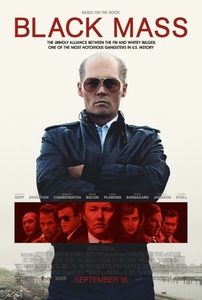
Movies
Reviews

Review: Black Mass
Filed under: Reviews
As cold and uninviting as its subject, Black Mass is a competently made and star-studded look at the true life and crimes of legendary Boston mobster, James "Whitey" Bulger. The admittedly chilling source material somehow never manages to deliver any chills. Contemporary audiences have seen too many faceless characters shot to death in films to be shocked by sudden bursts of violence or even copious amounts of blood. We've seen this all before. Black Mass brings nothing new to the gangster movie table, save for the specific minutia of Bulger's case, which is less compelling than your average Sopranos episode.
The film's defenders may retort, "Unlike The Sopranos, this stuff actually happened." I simply don't care if it's factual. I would much prefer it were interesting, or at least, engaging.
We meet various Boston lowlifes and thugs, who beat each other in alleys and sometimes kill each other with guns. Will we get to know these guys, Bulger's foot soldiers? Not really. They're only here to tell us (sometimes directly into the camera) about the brooding and psychotic Bulger. On the other side of the legal line, FBI agent John Connolly (Joel Edgerton) conspires to make Bulger a federal informant. The narrative is framed by the confessions of Bulger's underlings, who want to make it clear that they're not "rats," despite their selfishly rat-like behavior.
How are we supposed to feel about these characters? I take it fascination is the desired effect. Are we supposed to like Whitey Bulger? I don't think so. A subplot about Whitey's young son seems to indicate some form of character development, until that plot strand (and development) is abandoned and never addressed again. The film contains none of the nuance and humanity of a masterpiece like Goodfellas, in which even the nastiest character was perversely intriguing and dare I say, funny. Incidentally, there are no moments of levity in the cheerless and plodding Black Mass.
Much of the blame seems to be owed to director Scott Cooper, whose tonal grasp on the material falters, rendering even the most action-packed scenes dull and lifeless. Masanobu Takayanagi's cinematography is unique and often, gorgeous. The many close-ups on the faces of criminals confessing their sins to police are captivating, but never manage to transcend the fleeting surface beauty of Takayanagi's photographic composition.
Perhaps there are people who already know Bulger's story and eagerly await specific scenes with ghoulish anticipation. I was unfamiliar with his tale, and thus, simply watched as an unlikable man stalks through life, menacing anyone who betrays a sign of weakness.
The film, written by Mark Mallouk and Jez Butterworth from two separate books on Bulger's life, leaves the audience without an easy access point into this criminal underworld. Unlike the superior Donnie Brasco, in which the access point was Depp's fish-out-of-water undercover cop, even the few morally honest FBI agents seem villainous and hateful.
The cast is overflowing with marquee names, all of whom swing for the fences with thick South Boston accents. Characters who should be morbidly fascinating are left as inert, make-up spackled lumps, thanks to the plot-heavy dialogue they're forced to recite. The likes of Johnny Depp, Benedict Cumberbatch, Kevin Bacon, Joel Edgerton and Peter Sarsgaard employ flamboyant performances, shooting off behavioral fireworks, all to no avail. Individual scenes are intriguing, but as a whole, the narrative does not add up to much.
A glimmer of hope can be found in the performances of Rory Cochran (Dazed and Confused) and Jesse Plemons (Breaking Bad.) Playing members of Bulger's gang, both actors shine despite the lack of a spotlight on their roles. Cochran's subplot involving his poor step-daughter (the continually marvelous Juno Temple, who also escapes unscathed) is the film's most disturbingly enthralling stretch. The sequence reaches a macabre climax and earns its shocking denouement. The remainder of the film's body count is relegated to corrupt, murderous criminals whose fates we hardly mourn.
At his best, Johnny Depp is one of the most skillful actors of his generation. He's given us iconic and dynamic performances in films like Edward Scissorhands, Dead Man, Blow, and even (dare I say) Pirates of the Caribbean: The Curse of the Black Pearl. His finest role is undoubtedly his portrayal of cult filmmaker, Ed Wood. Even his more cheerfully bizarre outings such as Cry Baby and Fear and Loathing in Las Vegas are additively fun. At his worst, Depp seems like a kid who enjoys playing dress-up perhaps a little too much. His recent string of curiosities have not been received well by critics. Mortdecai was a goofy, tone-deaf comedic misstep. The Lone Ranger was an underrated, but admittedly miscalculated blockbuster flop. Even that tiny role in Kevin Smith's Tusk was silly and utterly beneath Depp's talents.
As Bulger, Depp never for a moment convinces us that he's anything but a movie star wearing make-up and blue-colored contact lenses. The film contains a variation on the 'gangster intimidates a civilian with carefully chosen words' scene. You know... the threat of violence that isn't phrased in a legally threatening manner. This could have achieved Hannibal Lecter and Clarice Starling levels of scary. Instead, it's two hapless actors playing a tensionless scene that we've sat through dozens of times before.
I have no moral objection to this type of story. There are many great films about evil, murderous characters. Unfortunately, Black Mass just isn't a very thoughtful or entertaining example.
Tags: Black Mass, Johnny Depp, Joel Edgerton, Rory Cochran, Kevin Bacon, Benedict Cumberbatch
Related Posts
- Review: The Toxic Avenger
- Review: The Gift
- Review: The Hobbit: The Desolation of Smaug
- Blu-ray Review: X-Men: First Class
- Review: X-Men: First Class
Tony Hinds is a Canadian writer who studied film at the University of Winnipeg. In addition to ShowbizMonkeys.com, Tony has reviewed films for Step On Magazine and The Uniter. You can find Tony on Twitter.






Comments Posted (